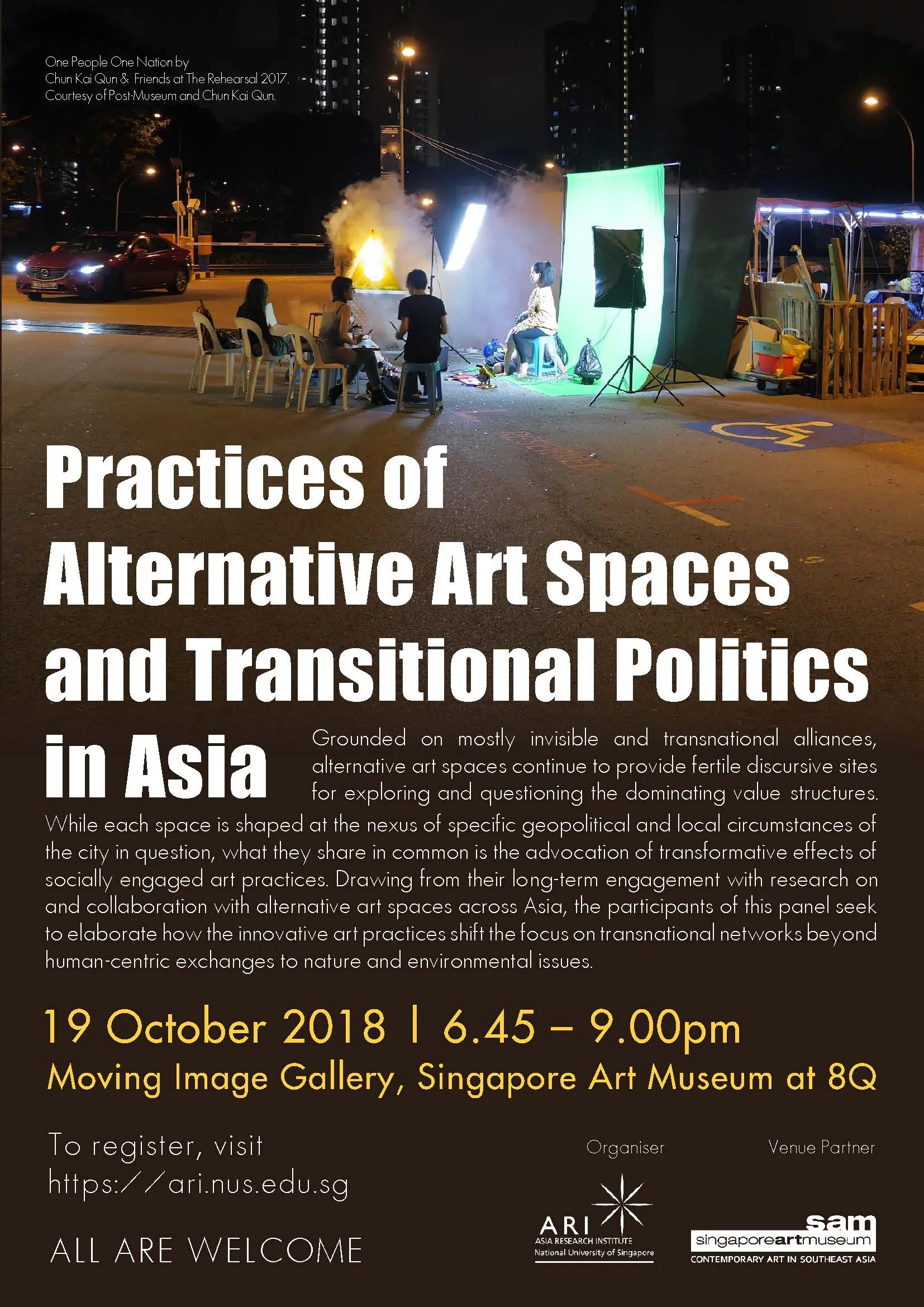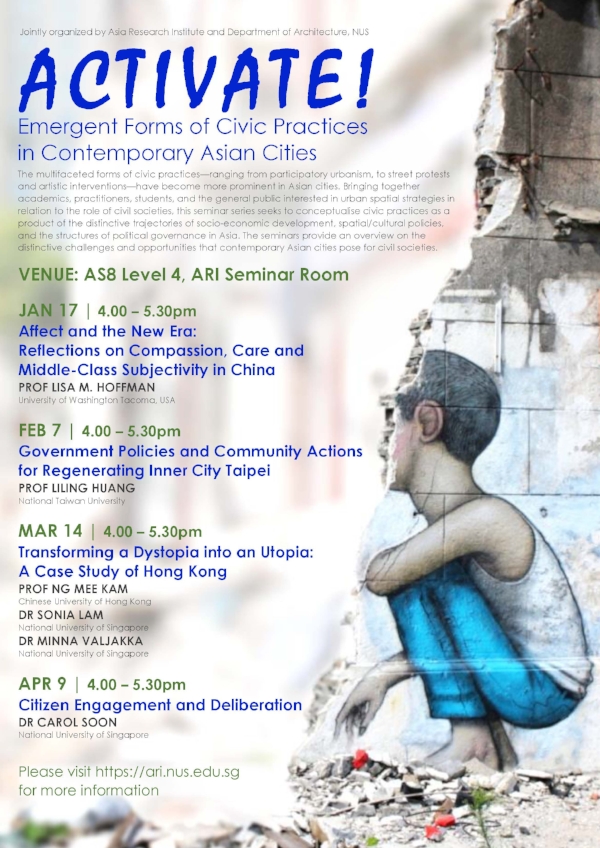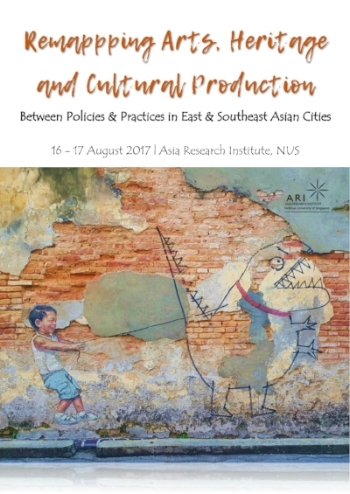Conference 25-26 October 2018 at National University of Singapore and
film seminar on 27 October 2018 at National Gallery of Singapore
Conference convenors: Minna Valjakka & Kiven Strohm
NGS Curators: Sam I-shan, Silke Schmickl & Seng Yu Jin
By taking undergrounds as the conceptual lens, this conference seeks a more holistic understanding of experimental cultures, their interrelations, past traditions and current, even apolitical, positions and (non-)spatial adjustments in the urban environment. Building on the perceptions that challenge the existing paradigms of alternative cultures’ ability to resist neoliberal market economy and the empowering forces of anonymity and diversity in cities, the aim is to critically analyse the intricate sociopolitical and cultural dynamics that continuously reposition undergrounds in East and Southeast Asian cities today. Given that the geopolitical and sociocultural circumstances are continuously changing, the questions of whether undergrounds can survive in conditions of strengthening censorship, or whether they are needed after a change of regime are ever more timely. Besides spatial and ideological strategies, attention is also given to the formal and stylistic dedications of undergrounds. Further studies on the processes of conceptual situating across temporal and spatial scales can illuminate whether undergrounds today are to be understood as alternative tangible spaces with limited access, as vernacular radicalism (Duncombe 1997), as a cultural philosophy to exist outside of the mainstream (Graham 2010), and/or as a form of cosmopolitanism urbanism (Martin-Iverson 2014).
The conference is organized in collaboration with National Gallery Singapore, who will host a one-day film seminar of curated screenings, academic presentations, and panel discussions centred around experimental film practice on Saturday (27 October 2018) at the gallery.
Easily reproducible and disseminated, the medium of the moving image was adapted by artists working with readily available video or digital recording equipment to make experimental or subversive work in response to shifts in cultural and political climates. The term ‘underground’ in film (Vanderbeek 1961) has been consciously adapted by those seeking to express aspects of countercultures, the marginal, and transgressive in the face of hegemonic value systems represented by mainstream cultures. Meanwhile, the notion of the avant-garde focuses on self-conscious use of the film medium, drawing upon radically dissenting techniques that include fragmentation, multiple interpretive possibilities, non-linear narratives, and esoteric approaches.
Practices of Alternative Art Spaces and
Transitional Politics in Asia
Round table 19 October 2018, Moving Image Gallery, Singapore Art Museum at 8Q
Alternative art spaces through their transnational practices have reformulated the position and understanding of arts across Asia. In Singapore, this ‘spatial turn’ can be traced back to the eminent artist colony in Sembawang, The Artists Village (TAV), founded by Tang Da Wu in 1988. Characterized by aspirations of autonomy and coalescence of varied cultural practices, numerous spaces have since pursued for alternative visions of and for societal change. Grounded on mostly invisible and transnational alliances, extending beyond urban conditions to rural communities, alternative art spaces continue to provide fertile discursive sites for exploring and questioning the dominating value structures. While each space is shaped at the nexus of specific geopolitical and local circumstances of the city in question, what they share in common is the advocation of transformative effects of socially engaged art practices. Drawing from their long-term engagement with research on and collaboration with alternative art spaces across Asia, the participants of this panel seek to elaborate how the innovative art practices move beyond “relational aesthetics” (Bourriaud 1998) and act with approaches ranging from “dialogue-based public art” (Finkelpearl 2000) to “collaborative art” (Kester 2011). Now it is imperative to reconsider these approaches to socially engaged art in Asian cultural contexts, such as Taiwan (Tung 2013), Japan (Jesty 2017) and Southeast Asia. At stake in this relational process then, are precisely the kinds of interaction and connectivity that shifts the focus on transnational networks beyond human-centric exchanges to nature and environmental issues, including but not limited to migratory pathways of birds, mobility of garbage and pollution across national borders. In this context, the significance of alternative art spaces and their transitional practices in Asian art may be understood as a precondition for the enactment of an artful societal change.
ACTIVATE!
Emergent Forms of Civic Practices in Contemporary Asian Cities
October 2017 - November 2018
Asia Research Institute | Minna Valjakka & Sonia Lam
Department of Architecture | Lee Kah Wee & Cho Im Sik
In recent years, the multifaceted forms of civic practices – ranging from participatory urbanism to artistic interventions and to street protests launched by activists – have become more prominent in Asian cities, attracting scholarly attention across different disciplines. The transformations in civil society have raised the following questions: What are the emerging challenges and contingencies the varied interest groups are facing? What kind of conflicts can arise during and after instances of civil activism, and how can these tensions be ameliorated? How can social engagement, practice and research be bridged together by, and for, different individuals and agencies? When does social engagement become perceived as civil activism?
Julien Malland (a.k.a. Seth), Shanghai, 2015. © Minna Valjakka
This seminar series, jointly organised by Asian Urbanisms cluster (ARI) and the Department of Architecture, critically presents and examines the novel forms of civic practices that have manifested in the Asian urban context through a transdisciplinary framework. Bringing together academics, practitioners, students and members of the general public interested in urban spatial strategies in relation to negotiating the formation and role of civil societies, the seminars seek to initiate discourse on the following themes: First, to explore how the varied stakeholders involved in civil society groups—including academics and educators, activists, artists, NGOs, NPOs, informal interest groups and community associations, political parties and governmental organizations—currently de/reconstruct the contextual and physical understanding of shared urban space in Asia. It is of interest to review the main goals of the novel civic practices, and the extent to which these aspirations are realised. Secondly, these seminars seek to articulate how stakeholders engage in the process of collaborative knowledge production through these practices. More importantly, the aim of the series is to conceptualise civic practices as a product of the distinctive trajectories of socio-economic development, spatial/cultural policies, and the structures of political governance in the Asian region. To reiterate, these seminars provide an overview on the distinctive challenges and opportunities that contemporary Asian cities pose for civil societies, and the kind of local and global characteristics that are emerging in these locales.
For more information on each seminar, please see ARI events.
Remapping Arts, Heritage and Cultural Production: Between Policies and Practices in East and Southeast Asian Cities
16‒17 August 2017
Convenors: Minna Valjakka, Creighton Connolly and Desmond Sham (ARI)
This interdisciplinary conference brings together a dynamic range of both established and early-career scholars, activists and creative practitioners to explore the role of arts, culture and heritage in developing more progressive societies in East and Southeast Asian cities. The conference includes case studies from numerous cities throughout the region, from South Korea to Singapore, on topics varying from art districts and art activism to heritage walks and cultural activism. Questions that guide the conference proceedings speak to integrated themes across these topics and sites to encourage conceptual and policy-relevant insights on the critical role of arts, heritage and creative practices in contemporary cities.
Deciphering Japan
10 June 2014
Convenor: Minna Valjakka
Seminar on documentary film making with Ian Thomas Ash and Adrian Storey, the Department of Musical Creativity and Environment, Tokyo University of the Arts, Japan.
Women in Contemporary China: Facing the Challenges of Agency
4 ‒ 5 December 2013
Convenors: Tiina Airaksinen, Elina Sinkkonen and Minna Valjakka
International seminar, the Department of World Cultures, University of Helsinki, Finland.





